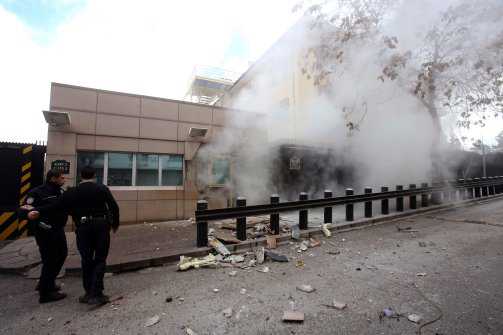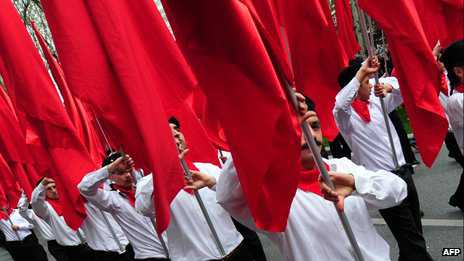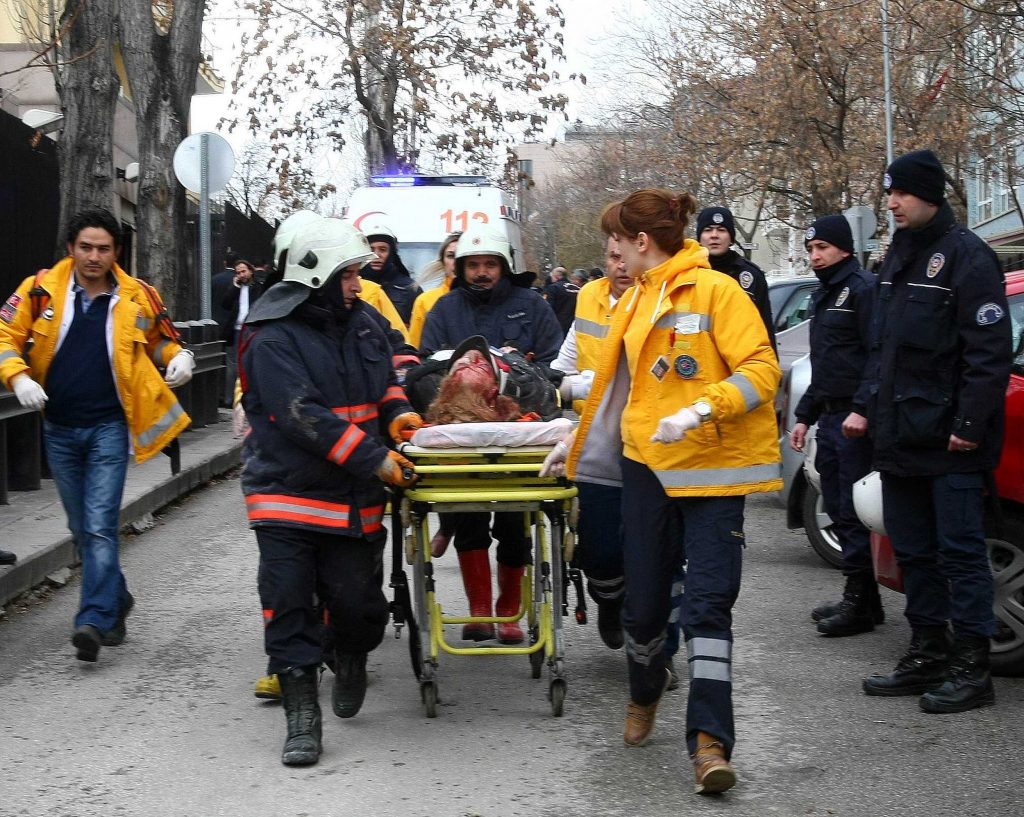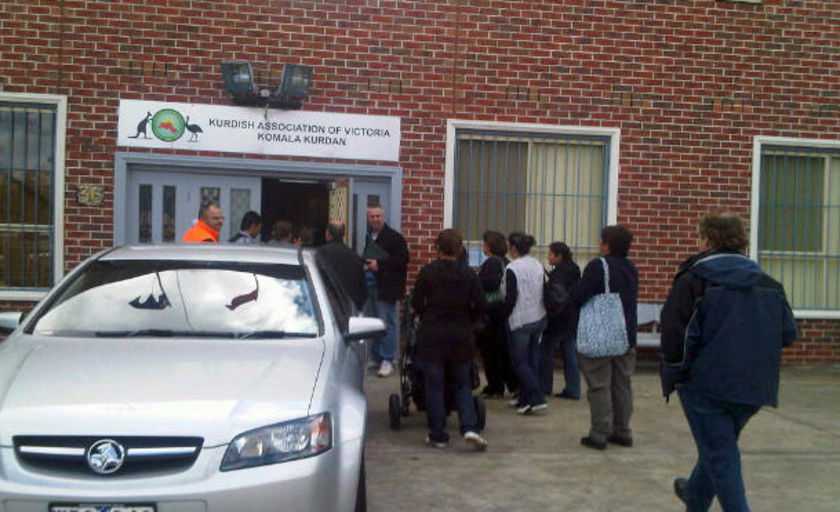Turkish officials named a long dormant terror group as responsible for Friday’s suicide attack at the U.S. embassy in Ankara. Why would the far-left group strike now?
When a suicide bomber at the U.S. embassy in Ankara detonated his charge on Friday, killing himself and a Turkish security guard, authorities looked beyond the usual terror suspects—al Qaeda or the Kurdistan Workers’ Party (known as the PKK)—to finger an obscure group thought to have faded into obsolescence since its heyday in the 1980s and ‘90s.

According to Prime Minister Recep Tayyip Erdogan, the attack was carried out by the Revolutionary People’s Liberation Party-Front, or DHKP-C. Founded in the late ‘70s as a Marxist-Leninist group first known as Devrimci Solo, or Dev Sol, it advocated armed struggle to overthrow the Turkish government and replace it with socialism. After the collapse of the Soviet Union, the group softened its Marxist rhetoric and shifted its focus toward winning recruits among Turkey’s urban ghettos and the country’s notorious prisons, where, officials say, the DHKP-C ran de facto indoctrination and training camps.
The group—which has long been listed as a terrorist organization by the U.S., European Union, and the Turkish government—gained notoriety in the 1990s for its attacks on American targets, and for its gruesome hunger strikes during Turkey’s controversial prison reforms. In two of its most high-profile attacks, the DHKP-C assassinated two U.S. military contractors in a protest against the first Gulf War, and launched a rocket at the U.S. consulate in Istanbul in 1992. In the late ‘90s, authorities also thwarted plans by the group to launch rocket attacks against the U.S. consulate and Incirlik Air Base in southern Turkey, where the U.S. had stationed forces to help patrol Iraq.
Even as it railed against America—a country it described in manifestos as “the total negation of democracy, justice, and freedom”—the group terrorized Turkey with a decade-long series of suicide bombings aimed at government targets. In one of the grisliest, in 2001, a suicide bomber linked to the DHKP-C killed himself and three policemen in Istanbul, wounding 30 others; the group claimed the attack was revenge for the death of 30 inmates who had resisted a move to a maximum-security prison and engaged in a firefight—fueled by smuggled weapons—with Turkish troops. Among the group’s other alleged or actual targets were Turkish soldiers, the Justice Ministry, onetime Prime Minister Tansu Ciller, and the heir to one of Turkey’s richest families, who was murdered alongside a business partner and a secretary by DHKP-C extremists in Toyota’s Istanbul headquarters in 1996.
Despite its high-profile acts of violence—which led then-CIA Director George Tenet to call out the group, along with Colombia’s FARC rebels and Hamas, in a 2002 report to Congress as a potential target for future American anti-terror operations—it has lost much of its influence in recent years. Turkish authorities and their European counterparts have cracked down on the group at home and abroad, effectively dismantling the group’s leadership and cutting off its funding sources. According to most experts, the DHKP-C’s membership has dwindled, along with its political influence—which makes it all the more bewildering that the group is now resurfacing in the Turkish news.
In January, Istanbul police announced an operation in seven cities that had detained 85 people accused of having links to the DHKP-C—including 11 lawyers accused of leaking state secrets to Greece and Syria. As noted by Michael Weiss, a Syria analyst and columnist with NOW Lebanon, the far left in Turkey has recently taken issue with the deployment of NATO Patriot missiles to defend the country against potential spillover from the conflict in Syria—one possible motivation for the embassy attack. He says Turkish authorities, locked in bitter animosity with Syria’s government over its neighbor’s brutal civil war, may be keen to press the Syria link in the coming days. “It is interesting that the target was the American embassy,” Weiss says. “Patriot missiles have just arrived in southern Turkey. And not two weeks ago, Istanbul police were claiming the DHKP-C lawyers had been detained on suspicion of giving state secrets to Syria and Greece. So there’s a strong likelihood that Turkish security will try to connect this attack to Damascus in some way.”
The group might still have enough strength left to cause more problems for the U.S. and Turkey, especially as the countries struggle to deal with the chaos across the border in Syria.
But Ross Wilson, the American ambassador to Turkey from 2005-08, interprets the attacks as a last gasp in a dying breed of Turkish leftist terror. He says the group has been weakened considerably over the years, and may have staked out such a high-profile target in a bid to get attention—as well as in retaliation for the recent arrests by Turkish authorities. “There have been protests against the Patriots, and there is a strain in Turkey of virulent anti-Americanism, of the kind that turns out to protest whenever we do anything,” says Wilson, who now directs the Dinu Patriciu Eurasia Center at the Atlantic Council. “I think the DHKP-C may be trying to get back into the business here—but their agenda is not just opposing Patriots, but [it is] extreme violence and murder. That worked in the 1970s and ‘80s, but Turkey has really moved on from those left-right battles.”
Still, the group might still have enough strength left to cause more problems for the U.S. and Turkey, especially as the countries struggle to deal with the chaos across the border in Syria. “If the DHKP-C, whose hallmark is threatening U.S. interests in Turkey, is indeed behind this attack, it suggests to me that—as small as this and similar groups are,” says Soner Cagaptay, an expert on Turkey at the Washington Institute for Near East Policy, “they will pose a continued risk to further U.S.-NATO deployments in Turkey.”
http://www.thedailybeast.com/articles/2013/02/02/what-s-behind-the-turkey-bombing-a-look-at-the-dhkp-c.html





